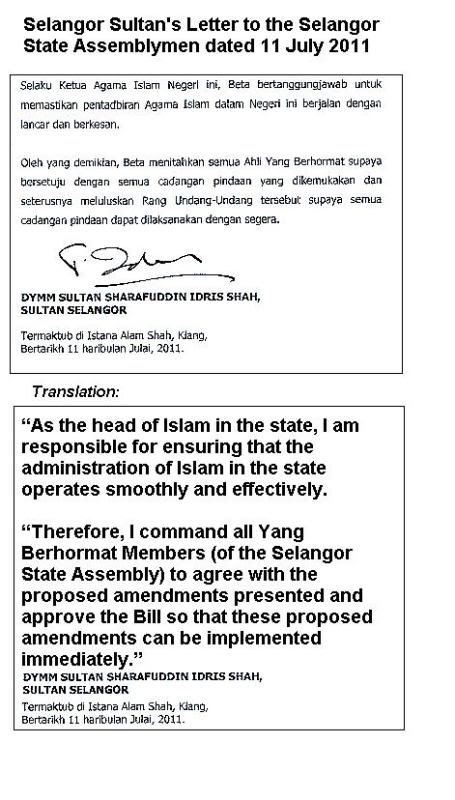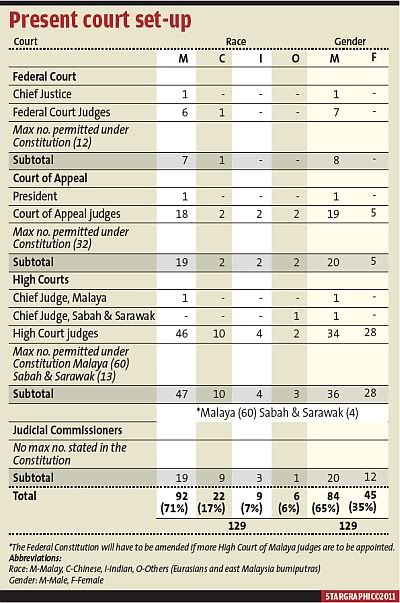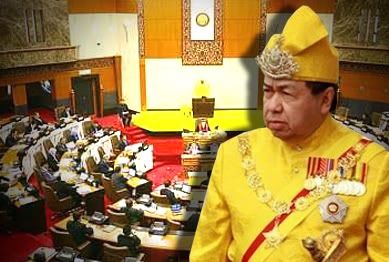 Read here and here
Read here and here
Selangor state assemblymen are seeing red with what appears to be
royal intervention in the RUNNING of the State Legislative Assembly.In July, every state assemblyman allegedy received a letter from Sultan Sharafudin Idris Shah, commanding them to agree to amendments that would supposedly give the Ruler more power over Islamic affairs. (The state assemblymen) say it could have led to a constitutional crisis.
The letter was
accompanied by a Selangor government gazette with proposed amendments to the Administration of the Religion of Islam (State of Selangor) Enactment 2003.
One assemblyman , who spoke under condition of anonymity, said they saw the letter on their desks at about 9:30am when they attended the July 11 state assembly sitting.
He said,
“We did not know what to do. We were totally shocked. It was a very delicate situation. If we went against it, it would have caused a constitutional crisis.
The Sultan is supposed to act on the advice of the state government, not the other way around. Even in the matters of Islam and Malay culture, the Sultan has to act on the advice of the state administration.
WE DIDN'T WANT TO FIGHT THE PALACE. We had respect for the palace. WE LET IT PASS.”
He added that if the assembly had snubbed the letter and voted against the proposed amendments, it would have been played to the hilt by both the mainstream and the Umno-led state opposition.
Phone call from palaceAnother assemblyman, who also spoke to FMT anonymously, said that the proposed amendments were initially made available at a state pre-council meeting, a “
few days” before July 11.
According to the state assemblyman:
- Many state assemblymen present at the meeting were unhappy with the bill and hotly debated the details. “They voiced their displeasure at the bill. They felt they should have been consulted first because of its importance.
- The Selangor mufti, state legal adviser and aides to the various assemblymen were also at the meeting
- Menteri Besar Khalid Ibrahim said he was troubled by the introduction of the amendments.
- "The MB requested that the bill be kept in abeyance pending further study.”
- “The MB asked the officers to leave and the assemblymen to stay to discuss the bill.”
- Halfway through the discussion, Khalid had to step out to take a call from the palace. Apparently, the displeasure of the state assemblymen had been conveyed to the palace.
- “The MB did not make it clear what the palace had said, but the assemblymen took the cue, and understanding his (Khalid) predicament, did not pursue the postponement of the bill.”
- The Sultan EXCEEDED his powers when he ordered assemblymen to pass the amendments.
- Nevertheless, the BILL WAS PASSED after three readings.
Sultan’s Letter to the Selangor State AssemblymenThe letter was issued from the Alam Shah palace in Klang on July 11 and has the Sultan’s signature on it.

A copy of the letter was given to
Free Malaysia Today (FMT) by an anonymous sender.
A letter from the Sultan’s private secretary, Mohamed Munir Bani, to state assembly secretary Mohamad Yasin Bidin was also provided to FMT.
It reads:
“I respectfully present the decree of His Majesty the Sultan of Selangor… to be distributed to all Selangor State Assemblymen immediately.”
The proposed amendments would:
- Make the administration of all mosques and suraus fall under the purview of the Selangor Islamic Religious Council (MAIS).
- This responsibility was previously held by the director of Selangor Islamic Religious Department (JAIS).
- Give the Sultan the right to directly appoint anyone to the post of MAIS secretary.
- Remove the need to record in verbatim every resolution and policy made during MAIS meetings.
- Require all practising Syariah lawyers in the state to be Muslim.
- Require cheques issued by MAIS to be drawn according to its own financial procedures.
- Remove the need for MAIS and any corporation established under the Enactment to adhere to provisions in the Statutory Bodies (Accounts and Annual Reports) Act 1980.
- Give MAIS the power not only to collect zakat and tithes, but also to distribute it.
- Give MAIS the power to appoint anyone as mosque officials.
- Give MAIS the right to control and direct the duties of mosque committees.
There were 22 clauses stated in the provided gazette, with amendments to 21 sections within the Enactment.
A Pakatan Rakyat leader, who asked to remain anonymous, also said he suspected that Umno had pushed the palace said,
“The Sultan has been advised by Umno for 50 years. This put His Majesty in a very difficult situation. This was a ploy by Umno to put Pakatan at loggerheads with the Sultan.
He defended the Sultan as an “objective” person, but said Mohamad Munir, being pro-Umno, had made it difficult for Khalid to get an audience.
Sungai Panjang state assemblyman Mohamed Khir Toyo claimed ignorance of the matter, while Seri Serdang assemblyman and state opposition leader Mohamad Satim Diman could not be contacted.
RELATED ARTICLESelangor Sultan Over Stepped Constitutional Boundaries, says Law Expert Aziz BariThe Selangor Sultan may have overstepped his powers by commanding state assemblypersons to pass a Bill back in July, said Universiti Islam Antarabangsa (UIA) law professor Abdul Aziz Bari.
He said this when asked to comment on a
decree signed by Sultan Sharafudin Idris Shah, ordering them to pass a slew of amendments to EXPAND the powers of both the SULTAN and Selangor Islamic Religious Council (Mais) over Islamic affairs in the state.The decree, dated July 11, a copy of which was given to Malaysiakini was attached with a letter signed by the sultan's private secretary, Mohamed Munir Bani.
To AVOID another confrontation with the palace, Pakatan Rakyat lawmakers COMPROMISED and PASSED the amendments to the Administration of the Religion of Islam (State of Selangor) Enactment 2003, although they saw it as a form of ROYAL INTERVENTION with the STATE LEGISLATURE.Since taking over the state government in March 2008,
Pakatan has been at loggerheads with the palace over several issues.Constitution Does NOT Provide Sultan with the PowersAziz, an expert in constitutional matters and have written extensively on the role of the monarch, said the constitution may not provide the sultan such powers.
He pointed out that although the Federal Constitution - Article 3(2) and Section 1(2)(d) of the Eighth Schedule - clearly states that the sultan can act without or against the government on matters pertaining to Islam and Malay customs,
it was SILENT on the part of the legislature.Aziz Bari said,
"While on Islamic matters the sultan may ignore the government advice, the same may NOT be applicable when it comes to the legislature.
We are NOW dealing with the legislative power over which the government CANNOT control. In fact the government is subservient - or answerable - to it.
The sultan is only free from government, but that does NOT mean that he (Sultan) is also free from the House.
Nonetheless interference in such petty matters, could make the monarchy, which ought to be aloof and symbolic, embroiled or entangled in mundane and routine matters, thus putting its integrity at stake.
It is just too much and would jeopardise the integrity of the palace; especially after what happened in Perak and Selangor after 2008.The fear is the powers may be exercised by some other parties.
For one thing the sultan may be too busy and this may lead to a situation where certain parties step in under his name.
Given that, what will happen to his role and position as the father figure of the state?"
Some of the amendments that give Mais the power to collect and distribute zakat as well as fitrah and free the council's account from being audited by the Auditor-General, were simply taking a reverse direction against calls for greater accountability.
Perhaps we can look at one example - the state awards. Although the constitution acknowledges the power of the sultan, it also makes it compulsory to get the consent of the legislative assembly should this have a financial implication.
It (the amendment) can exempt the bodies concerned from scrutiny and this is bad from the constitutional point of view."
Another controversy that has arisen from the amendments, is giving Mais the authority to administer mosques and suraus, including the power to appoint mosque officials and to direct the duties of mosque committees.
There are quite many mosques and suraus that have been built by the peoplehttp://www.blogger.com/img/blank.gif themselves; not from the public purse.
The new provision could be used against these privately-funded mosques and this is not good.
"This is where the position and power of the sultan needs to be seen in the light of Islamic ideals that actually stand at the very heart of the provision concerned."
Selangor Sultan's Demands for Amendments to a Selangor state law removes Selangor's Islamic Religious Council (MAIS) Accountability to the State Government.Read
here for moreIt’s a bitter pill to swallow for many Selangor assemblymen now that the
government may have lost control over the state’s Islamic administrative matters and the estimated tens of millions of ringgit in annual zakat collections.
The amendments made in July seemingly allowed the state’s Islamic Religious Council (MAIS) to be accountable only to the Sultan of Selangor, Sultan Sharafudin Idris Shah, bypassing the state government in the process. The amendments affected the Administration of the Religion of Islam (State of Selangor) Enactment 2003.
Previously, Section 16 of the Enactment – which was passed at the July State Legislative Assembly sitting –
enabled the director of Selangor’s Islamic Religious Department (JAIS) to be appointed as MAIS’s secretary.The secretary would also act as the council’s chief executive officer and administrator, and was responsible for carrying out MAIS’s policies and resolutions.
However, the July amendments took that detail out, and
allowed the Ruler “on advice of the Majlis” (MAIS) to appoint the council’s secretary.Speaking under condition of anonymity, a state assemblyman said that the change
allowed MAIS to snub summonses from the State Legislative Assembly’s committee.He told FMT.
“In one occasion, MAIS was summoned by a House committee overseeing statutory bodies and subsidiaries.
They refused to appear on the grounds that they were not subject to the committee.”
Zakat moneyThe assemblyman added that MAIS was a statutory body created by the Enactment, and had financial autonomy in its affairs. He said,
“They still have to table their audited accounts before the House… They can appoint their own auditors… But they are not duty-bound to come before the committee.
The effect of this, politically, is a government within a government, and Islamic affairs are taken out of the control of the state government,. .
This was of special concern, the assemblyman added, given that the amendments also gave MAIS the power to collect and distribute zakat as well as fitrah.
Selangor zakat money came up to about a third of the state government’s annual revenue which was roughly RM1.4 billion."
With this in tow, MAIS, according to an anonymous Pakatan Rakyat leader, could do whatever it wished with its companies without worrying about the state assembly looking over its shoulder.
The Pakatan leader said,
At the policy and state level, MAIS has six or seven government-linked companies under it… They said that the (state) government has no shared interest in MAIS’ corporations.
So they tried to twist this (to their advantage), by saying that the administration (of MAIS) is under the Sultan…
If we raised our voice (against it), they will raise the issue of derhaka (betrayal).”
Royal appointmentsFMT previously reported that Selangor state assemblymen allegedly received a letter from the Sultan at the July 11 state assembly sitting, commanding them to agree to these amendments.
Caught by surprise and fearing a constitutional crisis in the event of a refusal,
Pakatan state assemblymen ALLOWED the amendments to be passed without a hitch.Currently, the Sultan has the power to appoint the MAIS chairman, deputy chairman and “
not fewer than eight other members” to the council.
MAIS also consists of five ex-officio (automatic) members – the state secretary, state legal adviser, state financial officer, the mufti and the chief police officer.According to the anonymous state assemblyman, the building and administration of mosques and suraus were also affected by the amendments.
JAIS, as well as the state government, he claimed, would have to spend money to build them, while the administration of these buildings would fall under MAIS’ purview.
“Now, to build a mosque or a surau, you have to get approval from MAIS… Construction of the mosque is under JAIS, but the management is under MAIS,” he said.
Another interesting development was the deletion of Section 85 of the Enactment.
Provisions of the Statutory Bodies Act (Accounts and Annual Reports) Act 1980 now no longer apply to MAIS.
No need for auditAccording to Malaysian Centre for Constitutionalism and Human Rights lawyer K Shanmuga, this meant that
MAIS did NOT have to submit its accounts to the Auditor-General.He said,
“The effect of the amendment is that the accounts of MAIS (and any other statutory corporation established by MAIS under the Enactment) will no longer have to be audited in accordance with the Audit Act 1957 and submitted to the Auditor-General each year.
In fact, there appears to be no provisions in the Administration of the Religion of Islam Enactment requiring any audit.”
A script read by the proposer of the amendments passed at the July 11 state assembly sitting was also provided to FMT.
In regards to Section 85, it read:
“This section was abolished because the council is not included in the definition of ‘Statutory Body’ in regard to the Statutory Bodies (Accounts and Annual Reports) Act 1980 [Act 240].”
"I am jobless and without any source of income.




